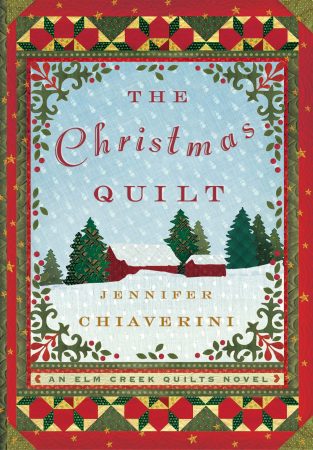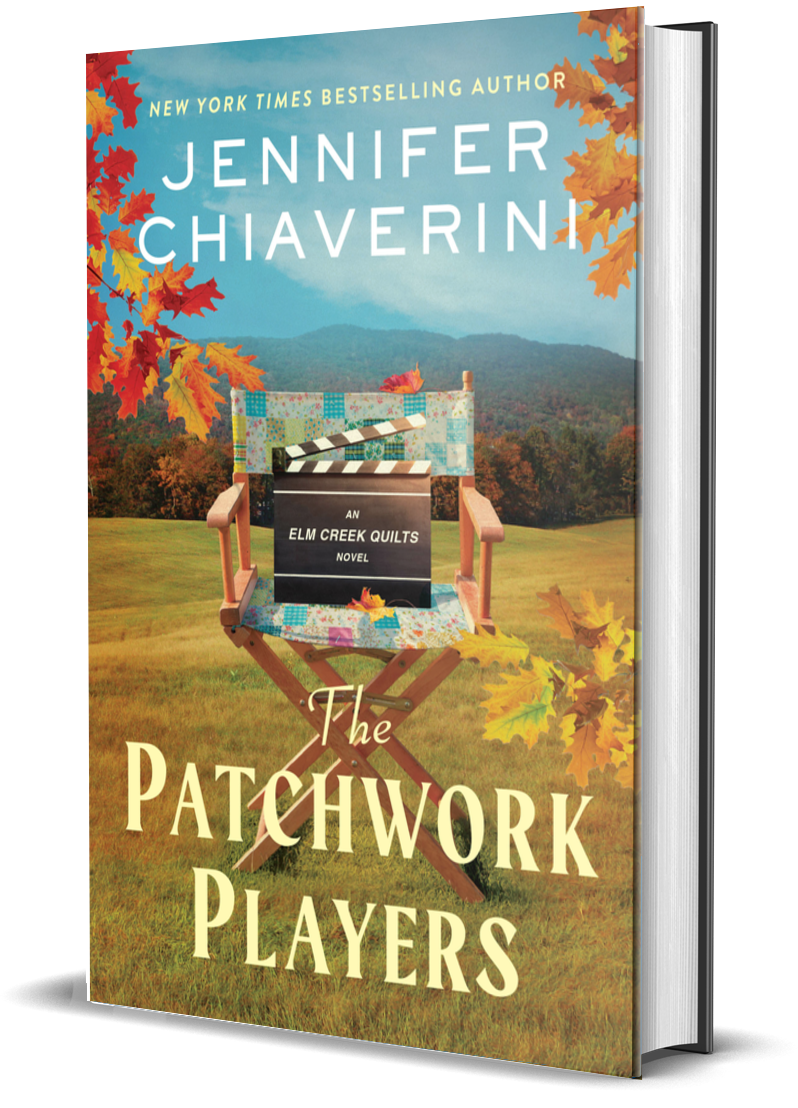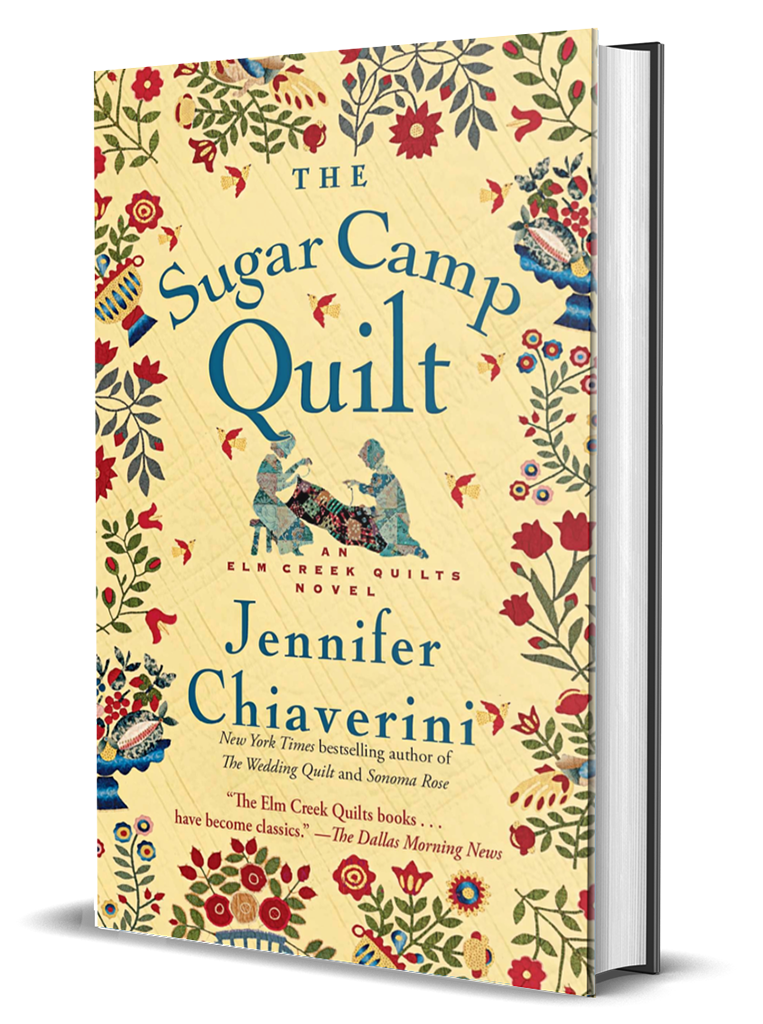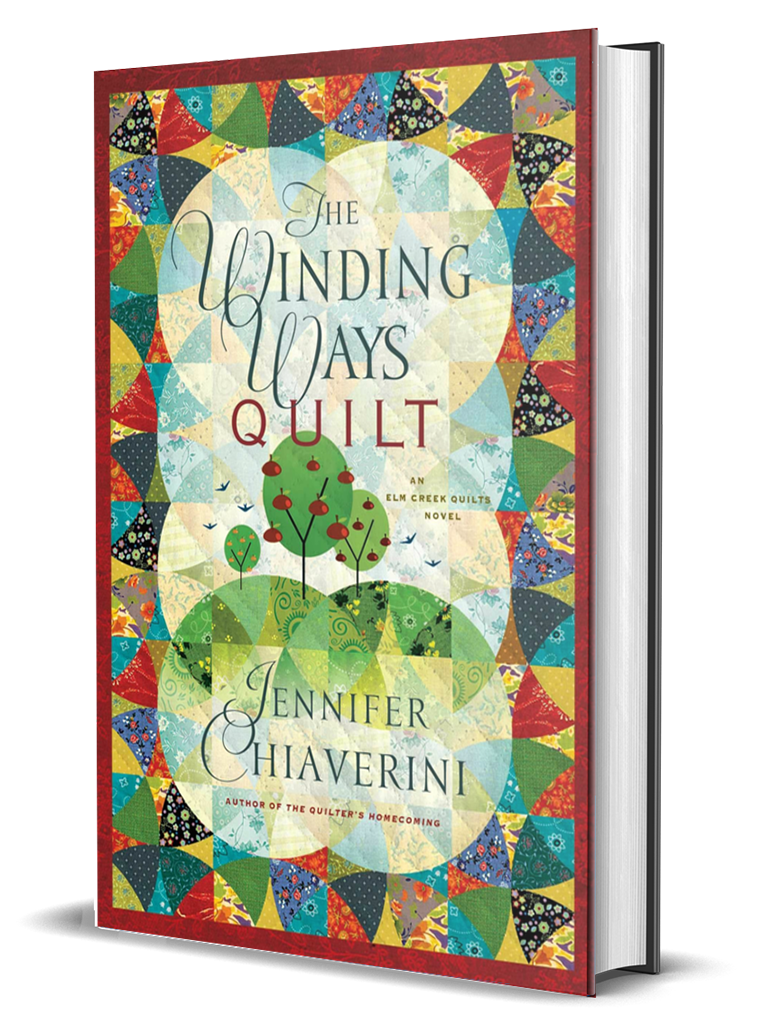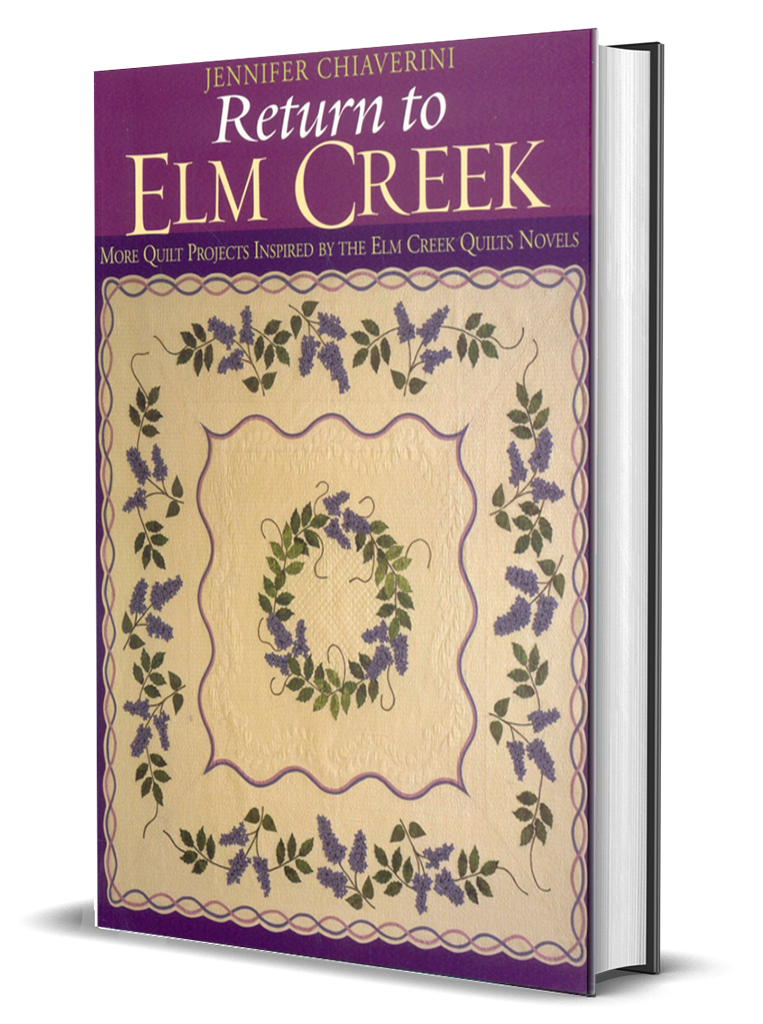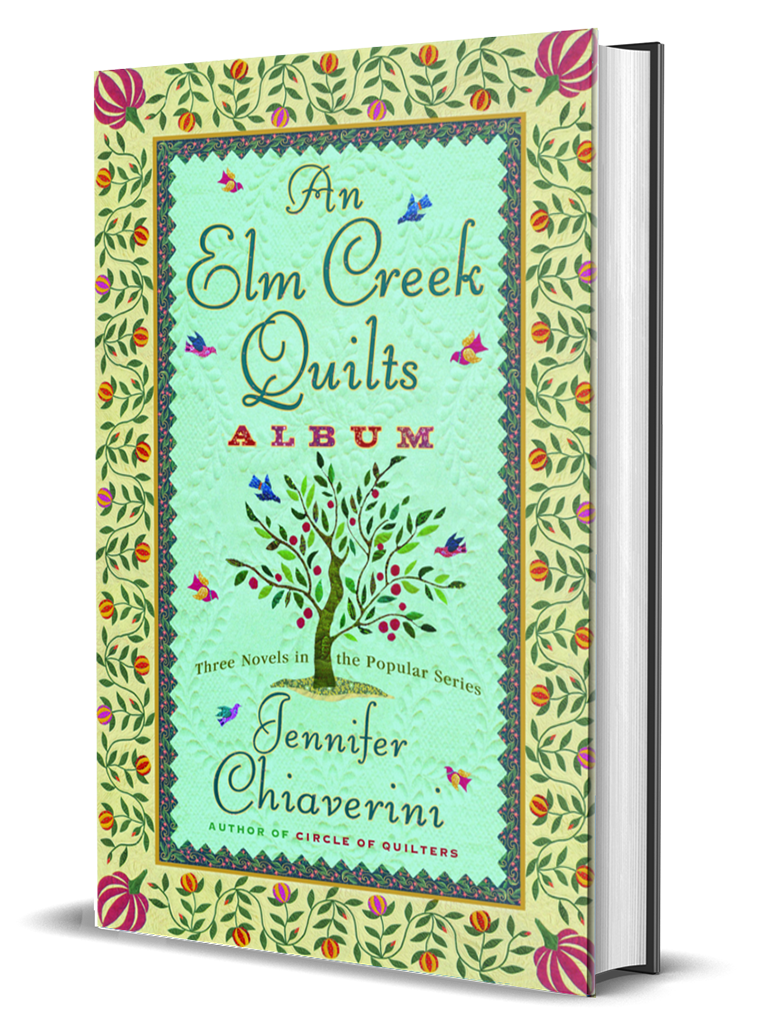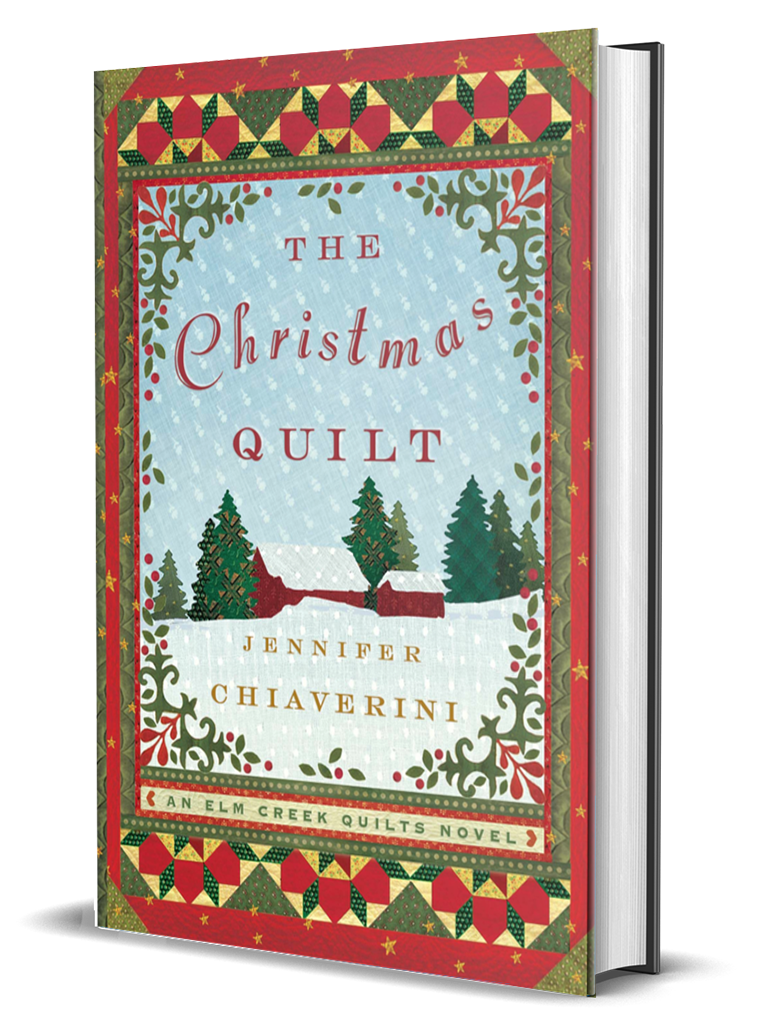
The Christmas Quilt
“The captivating story unfolds at a perfect pace. GRADE: A” – Ft.Worth Star-Telegram
“This redemptive novel beautifully threads together pieces of Sylvia’s life story while celebrating the strength of women, sisterhood and friendship. Wrap this one up for a cherished friend.”
– The Virginian-Pilot
Jennifer Chiaverini gives her fans a long-hoped-for holiday-themed story in THE CHRISTMAS QUILT, a heartwarming novel filled with the memories and traditions of Elm Creek Manor’s indomitable master quilter, Sylvia Bergstrom Compson. Infused with wisdom and rich with the flavors of the holidays, THE CHRISTMAS QUILT is a timeless tale that Elm Creek Quilts devotees are sure to cherish.
With her eight Elm Creek Quilts novels — which the Dallas Morning News has deemed “classics of their kind” — New York Times bestselling author Jennifer Chiaverini has inspired a legion of devoted readers by blending old-fashioned storytelling with a celebration of traditional women’s arts. Chiaverini gives her fans a long-hoped-for holiday-themed story in THE CHRISTMAS QUILT, a homespun novel filled with the memories and traditions of Elm Creek Manor’s indomitable master quilter, Sylvia Bergstrom Compson.
It is the morning of Christmas Eve at Elm Creek, and Sylvia is resisting the efforts of Sarah, her young partner in the Elm Creek Quilt Camp enterprise, to infuse the Manor with a bit of Christmas cheer. Sylvia, opinionated to the last, thinks that Sarah and her husband Matt should spend the holiday with Sarah’s intractable mother, but Sarah insists that Sylvia should not be on her own. Reluctantly, Sylvia agrees to Sarah decorating a few of the rooms, but when the women retrieve the boxes of Christmas ornaments from the attic, it opens an unexpected floodgate of memories and emotions for the aging matriarch.
Among the decades-old Christmas decorations, they find a long-forgotten, unfinished Christmas quilt. With bittersweet nostalgia, Sylvia admires the work her Great-aunt Lucinda and her mother, Eleanor, did on the project — including intricate Feathered Star blocks and graceful appliqued clusters of holly leaves and berries — but derides her sister Claudia’s second-rate contribution. Only two years apart in age, the sisters always had a fractious childhood relationship, which becomes a focal point of Sylvia’s memories of Christmases past.
Her reminiscences begin during the Great Depression, when the once grand Bergstrom traditions needed to be curtailed for the first time. The ensuing years will witness the premature death of her kind-hearted mother, the loss of a beloved cousin, and the disruption of the family-rending Second World War II. Throughout, the domestic arts handed down to each generation of Bergstrom women remain a sustaining constant, including quilting, knitting, and baking — especially their unrivaled Christmas strudel.
As the years pass, Sylvia and Claudia remain locked in battle, until a final family tragedy separates them forever. Now, as the only surviving Bergstrom, Sylvia begins to come to terms with her emotional ambivalence, brought to the fore by the Christmas quilt that inextricably ties her and Claudia together. But while it is too late for a Bergstrom rapprochement, Sylvia realizes it is not too late for Sarah and her mother to avoid making the same mistakes.
“Jennifer Chiaverini is one of the most compelling storytellers. . . . She makes her characters and plots so real readers feel as if they have stepped back in time,” the Green Bay Press-Gazette has said of the Elm Creek Quilts series. Infused with wisdom and rich with the flavor of the holidays, THE CHRISTMAS QUILT is a timeless tale that Jennifer Chiaverini devotees are sure to cherish.
Praise for The Christmas Quilt
Read an Excerpt from The Christmas Quilt
Sylvia’s childhood home was so full of memories it was a wonder there was any room left over for furniture. As the December days grew colder and the nights longer, the bygone years seemed to encroach ever more insistently into the present–vexing Sylvia day and night with their persistence. She imagined spirits of Christmases past crowding the halls, arguing over favorite chairs by the fire, looking about Elm Creek Manor and shaking their heads in dismay over how she had let the place go. She would earn a small fortune if she could charge them rent, but regrettably, the spirits offered her nothing except longing whispers and mournful sighs. Nothing would appease them save an old-fashioned Bergstrom family Christmas, with all the trappings of the holiday, every beloved tradition fulfilled to the letter.
If Sylvia addressed the spirits–which she would not do, she was seventy-seven but not quite ready to speak aloud to an empty room, thank you very much–she would warn them that they were bound to be disappointed. As much as Sylvia missed the Christmas joys of her youth, the Bergstroms were gone, every last one of them save Sylvia herself, and their traditions had passed on with them. Besides, Sylvia had a plan whose success depended upon this being the dullest, least festive, and most yawn-inducing Christmas in the history of Elm Creek Manor.
She was certain that nothing less would convince her young friend, Sarah McClure, to spend the holidays with her mother instead of Sylvia. Oh, she had tried dropping hints, appealing to Sarah’s sense of filial duty, and making her case to Sarah’s husband, but all to no avail. Sarah seemed blissfully indifferent to the idea of leaving her mother alone on Christmas. Not a single pang of guilt pricked her as she addressed Christmas cards and shopped for gifts and sewed three quilted stockings to hang before the fireplace in the library. She laughed off Sylvia’s warnings that Christmas in their remote central Pennsylvania home would be quiet and dull. “Excitement is precisely what I’m trying to avoid,” explained Sarah. “Christmas at my mother’s house would be interesting, but for all the wrong reasons.”
Exasperated, Sylvia strengthened her resolve to bring about reconciliation between Sarah and her mother. After all, Sarah had promised to try. A year and a half earlier, Sylvia had returned to Elm Creek Manor after a fifty years’ absence, the sole heir to the Bergstrom estate upon the death of her estranged sister, Claudia. She had intended to sell it, but with Sarah’s help, she made peace with her past and realized that she could never sell her beloved family home. The question remained, however, how to restore life and happiness to the manor, which was much too large for one old woman living alone. Sarah had devised an ingenious solution, combining their love for quilting with their need for community by turning the Bergstrom estate into a summer retreat for quilters. As Sylvia and Sarah negotiated their agreement to go into business together, Sylvia, in repayment for all Sarah had done to help Sylvia reconcile with estranged loved ones, decided to add a clause that would encourage Sarah to mend fences in her own life.
“I don’t know what kind of conflict stands between you and your mother,” Sylvia had said, “but you must promise me you’ll talk to her and do your best to resolve it. Don’t be a stubborn fool like me and let grudges smolder and relationships die.”
The unexpected request had clearly caught Sarah by surprise. “I don’t think you know how difficult that will be.”
“I don’t pretend to know, but I can guess. I don’t expect miracles. All I ask is that you learn from my mistakes and try.”
Sarah had hesitated so long before making her reply that Sylvia had feared she would refuse and that their agreement to create Elm Creek Quilt Camp would fall through, but at last, Sarah agreed. Sylvia took her at her word and both women devoted themselves to the creation of Elm Creek Quilts. They worked so hard that first year to make real their vision that Sylvia could excuse Sarah’s failure to make good on her promise. They were so busy, working fourteen-hour days or more with the help of Sarah’s husband and their talented staff of quilting teachers, that Sarah had no time to visit her mother and resolve their differences. But then camp ended for the summer, and still Sarah did little more than to call her mother for a brief chat every other week. When she announced her intention to spend the holidays at Elm Creek Manor, Sylvia realized that Sarah would put off fulfilling her promise forever if she could get away with it. Since voiding their agreement was out of the question–Elm Creek Quilts had enriched Sylvia’s life too much for her to throw it all away–she must see to it that her condition was fulfilled.
Sylvia figured there was no better time than Christmas to seek peace within a family, but Sarah could hardly reconcile with her mother from a hundred miles away. Somehow Sylvia had to persuade Sarah that she would have a much merrier Christmas in her own childhood home, with a mother who loved her, even if they did not always get along. Unfortunately, Sarah wasn’t buying. Instead of seeking a happier holiday elsewhere, she had become determined to force a Merry Christmas upon Sylvia whether she wanted one or not.
If Sylvia had her way, she would observe Christmas as she had every season since abandoning her family estate for a modest home in Sewickley, Pennsylvania–church services in the morning, a Christmas concert on the radio after, perhaps dinner later at the home of a persistent friend who refused to heed Sylvia’s firm assurances that she did not mind spending the holidays alone. It had always sufficed, and she had woken every December 26 relieved that she had made it through another Christmas without a fuss, without too many wistful reminiscences of holidays long past. But it had been much easier to ignore the whispers of memory from a distance. Now that she had returned home, she found herself longing to heed their call.
And if she didn’t know better, she might suspect that Sarah knew how close she was to giving in, so often did she tempt her to abandon her plans for an unremarkable Christmas.
“Sylvia?” Sarah called from the hallway, moments before she appeared in the doorway to the kitchen, where Sylvia was preparing a cup of tea. “Are you busy?”
Sylvia stirred honey into her tea. “I was just about to settle down with a good book.”
“Good. Then you have time to help me find the Christmas decorations.”
“I already told you where to look.” Sylvia carried her cup into the west sitting room, her favorite place to read or quilt. Sunlight streamed in through the windows shut tight against the cold. Through the bare branches of the stately elms outside, she glimpsed the bright red of the barn on the other side of Elm Creek, a slash of gray-blue cutting through the white crust of snow.
“You told me the decorations are in the attic. If you can’t be more specific than that, it will be Easter before I find them.”
Sylvia shrugged, lifted her book from where it lay face down on her chair, and seated herself. “Perhaps you shouldn’t bother, then.”
“Honestly, Sylvia,” admonished Sarah. “It’s the morning of Christmas Eve. If we don’t decorate today, what’s the point?”
“You’re right. Why don’t we forgo decorations this year? We’ll have to take them down in a few days anyway. It hardly seems worth the effort.”
Sarah stared at her as if not quite sure whether she was joking. “I half expected you to wrap that up with a ‘Bah, Humbug!'”
Sylvia slipped on her glasses, which hung from a fine silver chain around her neck. “I am neither a Scrooge nor a Grinch, thank you, but I have kept a quiet Christmas since before you were born. I warned you time and time again. If you wanted something more festive, you and Matthew should have accepted your mother’s invitation to spend the holidays with her. I imagine her decorations are lovely.”
“She only asked me to come because she and her boyfriend cancelled their cruise after they broke up,” said Sarah, frowning as she usually did whenever Sylvia brought up her mother. “Besides, my mother invited me, not Matt.”
“Is that so? I assumed your husband was included implicitly. Husbands usually are for this sort of thing.”
“You’ve never met my mother or you’d know better than to assume Matt’s included unless she mentions him by name. She still hopes our wedding was a bad dream and she’ll wake up one morning to find me engaged to my boyfriend from freshman year at Penn State.”
Sylvia was certain Sarah was exaggerating. Matthew was a fine young man, and Sylvia could not imagine how Sarah’s mother could possibly disapprove of their marriage as vehemently as Sarah claimed. “But what of your agreement to alternate visits between your side of the family and Matthew’s? Since you spent last Christmas with his father, your mother was quite reasonable to expect you would visit her this year.”
“We could have.” Sarah sat down in the chair opposite Sylvia’s. “Except that we wanted to have Christmas here, with you.”
“Christmas is a time for family.”
“You know you’re like family to us. Elm Creek Manor is our home now. We couldn’t bear to leave you in this big house all alone at Christmas time.”
Sylvia feigned indifference and turned a page, although she had not read a word of it. “Don’t lay the burden of your decision at my feet. I managed just fine last year.”
“If we had known we were leaving you here by yourself, we would have stayed. You told us you were going to invite Agnes for Christmas dinner.”
“My sister-in-law was out of town visiting one of her daughters.”
“Yes, which you’d known since Thanksgiving but neglected to mention. Would you please put down that book and talk to me?”
Sylvia closed the book, marking her page with a finger, and peered at Sarah over the rims of her glasses. “Very well, young lady. I’m listening.”
Sarah regarded her with fond exasperation. “You keep suggesting that if Matt and I wanted a festive Christmas, we should have gone somewhere else. I don’t understand why we can’t celebrate a Merry Christmas here, with you.”
Privately, Sylvia acknowledged that Sarah had good reason to be puzzled. After all, they had so much worth celebrating: Sylvia’s return to the family estate, the successful first year of Elm Creek Quilt Camp, new friends, and a future bright with possibilities. If anyone ought to be dancing about with a “Merry Christmas” on her lips, it should be Sylvia.
She should have known Sarah was too perceptive to be deceived by her simple ruse, but she wasn’t quite ready to give up.
“I’m too old to make such a fuss,” she said. “Christmas is for children.”
She could tell from Sarah’s expression that she had done little to dampen her young friend’s enthusiasm. “Then long live childhood,” Sarah declared. Sylvia sighed and opened her book again, but Sarah reached over and closed it. “You must have some Bergstrom family Christmas traditions you’d like to revive.”
It was true; the Bergstroms had passed down many lovely Christmas traditions through the generations. The week before Christmas, the best cooks in the family would labor in the kitchen, turning out the most delicious treats–cookies, gingerbread, and strudel from her great-grandfather’s sister’s secret recipe. Delicious aromas of spices and baking once filled Elm Creek Manor at Christmastime, mingling with the scents of pine and holly and cinnamon. Every member of the family helped trim the stairways and mantles with freshly cut boughs, but only the most recently married couple was allowed to select the family Christmas tree. Before the south wing of the manor was constructed, the Christmas tree was displayed in the front parlor, but in later years it was set up in the ballroom. They adorned it with the accumulated treasures of three generations–ceramic figurines from Germany, sparkling crystal teardrops from New York City, carved wooden angels with woolen hair from Italy. The children’s favorite ornament was a glass star with eight large, serrated red points with gold tips. It shone in the candlelight from the top of the tree, casting flashes of ruby and gold from floor to ceiling. It was not placed upon the tree until Christmas Eve, when an adult would hide it somewhere in the manor and send the children searching for it. The lucky child who found the star would win a prize, a small toy or bag of candy, and would be lifted high to place the star on the top of the tree. Twice Sylvia had found the star, but after her brother learned to walk, she always let him find it. Her sister had never found the star without the help of a kindly uncle whispering in her ear.
There was so much more, of course–memories crowded in of church services, music, stories, friends, and laughter–but Sarah was only partially correct. Yes, the Bergstroms had enjoyed many wonderful holiday traditions, but Sylvia did not think she could bear seeing them restored by well-meaning youngsters who could not truly understand their significance, especially if it meant that Sarah would postpone for yet another year a visit home for Christmas.
Undaunted by Sylvia’s silence, Sarah persisted. “You’re not too old to sit back and enjoy Christmas decorations as long as I do all the work of setting them up, right?”
Sylvia sighed. There seemed little point in preventing her. “Of course not.”
Sarah took her hands. “Then come with me up to the attic. Point me in the right direction and I’ll unearth the decorations myself. We have to put up a little tinsel and holly or Santa will think we’ve forgotten him.”
Sylvia acquiesced and led Sarah upstairs to the third floor, where the younger woman tugged on a rope dangling from the trapdoor in the ceiling to lower the attic staircase. Sarah insisted Sylvia proceed her up the narrow, creaking steps–the better to break her fall should she stumble, Sylvia supposed. She shivered in the chilly darkness as Sarah stepped around her and groped for the braided twine pull cord fastened to the single, bare bulb fixed to the narrow beam running down the center of the peaked ceiling. With a click, pale light spilled down, illuminating a circle of the floor around them. Stacks of trunks, cartons, and old furniture cast deep shadows in the corners beyond the reach of the light.
To Sylvia’s right lay the older west wing of the manor, the original home of the Bergstrom family, built in the middle of the nineteenth century by the first Bergstroms to immigrate to America from Germany. Directly before her stretched the south wing, added when her father was a boy. In the attic, the seams joining the original house and the addition were more evident than on the first three stories, the color of the walls subtly different, the floor not quite even. Little visible evidence betrayed that fact, as the belongings of four generations of her family covered nearly every square foot of floor space.
Sarah surveyed the attic with satisfaction, in all likelihood congratulating herself for finally persuading Sylvia upstairs. “Well? Where should we begin?”
Sylvia hadn’t the faintest idea. Since returning from her self-imposed exile, she had visited the attic as infrequently as possible. She had not sought out the boxes of Christmas trimmings in more than fifty years, and a glance around at the piles of clutter yielded little useful information. The items closest to the trapdoor appeared newer than those stored deeper within the attic, as if in recent years her sister had kept her feet planted firmly on the staircase, lifted boxes and castoffs through the opening, and shoved them across the floor to get them out of the way.
“Over this way, I suppose,” Sylvia told Sarah, gesturing toward the steps. She described the containers they were looking for–two trunks, one green and one blue, and one sturdy carton. At first she stood aside and let Sarah do the work, but soon she began to feel foolish and impatient standing idle, so she joined in the search.
“I think I’ve found something,” called Sarah from the other side of the trap door. Sylvia watched as she dragged a long rectangular box into the open, her wavy brown hair falling into her face. On one side of the box printed in red ink above a forest of green pines were the words, “Festive Christmas Tree.” More ominously, smaller print in black announced, “Evergleam. Made in Manitowoc, Wisconsin, U.S.A.”
“I’ve never seen that before,” said Sylvia, dusting off her hands and coming closer for a better look. Sarah opened one end of the box, reached inside, and with some effort pulled out a handful of what appeared to be wood shavings as shiny as tin foil.
“It’s one of those aluminum Christmas trees,” said Sarah, delighted. “My grandmother used to have one.”
“Mine didn’t,” said Sylvia dryly, imagining her father’s mother recoiling in horror at the very thought. “This must be one of Claudia’s more recent contributions to the estate. It reflects her taste.”
“Oh, don’t be so hard on her. These were the height of fashion once.” Sylvia tugged until more of the atrocious foil tree emerged from the box. “I think it’s great.”
“Hmph. If you say so.”
“Would you mind if I set it up in my room?”
“If your husband can bear it, you may do whatever you like.” Sylvia quickly amended, “As long as you promise to keep it out of my sight.”
“I wonder if it came with one of those rotating colored floodlights like my grandmother had.” Sarah disappeared behind an old wardrobe, her voice momentarily replaced by the sound of boxes scuffing across the floor. “Wait a minute. Sylvia? What color did you say those trunks were?”
“One was blue and one green.” Sylvia picked her way through the clutter to join Sarah, who was removing a paint-spattered drop cloth from the top of a dusty forest green trunk with brass fastenings. “My word. You found it.”
“Here’s the other one,” said Sarah, beaming up at Sylvia in triumph, resting her hand on a blue trunk. “The carton must be nearby.”
“One would think so. There,” said Sylvia, gesturing as she spotted it. She could not help but be pleased to see them. Claudia had sold off so many things in Sylvia’s absence that she had prepared herself for the possibility that they would not have found the trunks in the attic. The Bergstroms’ old ornaments and trims probably had no more than sentimental value, but Sylvia would not have put it past Claudia to part with them for pocket change.
She tried to talk Sarah into waiting until her husband came home to carry the trunks and carton downstairs, but Sarah insisted upon doing it herself. It took four trips, but Sarah managed to wrestle them down the creaking attic steps and three more flights to the front foyer, with Sylvia doing little more to help than barking anxious directions when her young friend seemed likely to tumble down the stairwell. After the last was brought down, Sarah barely paused to catch her breath before throwing back the lid of the blue trunk. Sylvia looked on warily, wondering if her sister had replaced their family heirlooms with thin aluminum varieties, but she relaxed at the sight of green-and-red tartan tablecloth and a garland of gold beads. She watched as Sarah withdrew from the trunk one old familiar treasure after another–a wooden nativity set her grandfather had carved, eight Christmas stockings embroidered with the owners’ names, a china angel blowing a brass horn, all the familiar Christmas tree ornaments. The sight of them, each detail precisely as she had remembered it, jolted her. Everything else about the manor had aged and weathered in her absence, but the Christmas keepsakes looked exactly as they had when she last packed them away, as if they had not been disturbed in more than fifty years.
Was it possible that her sister had never opened the boxes in all that time?
As Sarah turned to the second trunk, Sylvia sat down on the floor beside her, marveling over each item as Sarah passed them to her. Her brother’s nutcracker, dressed in the bright red coat of a soldier, a sword in his fist. The wooden music box shaped like a sleigh full of toys that played “God Rest Ye Merry, Gentlemen” when the key was wound. The paper angels she and Claudia had made in Sunday school. A wreath made of pinecones she and her mother had gathered in the forest along Elm Creek. The memory of a snowy afternoon flooded her–the sound of her mother’s laughter, the crisp winter air nipping her cheeks–and she clutched the wreath so tightly that brittle pieces broke off in her fingers.
She gasped and set the wreath on the floor. Sarah glanced over her shoulder, her expression darkening with concern. “Are you all right?”
“I’m fine.” Sylvia shifted on the floor so that Sarah would think that discomfort rather than grief had provoked her. She forced a smile. “Well. You should have plenty of decorations to work with, don’t you agree?”
“Enough for the entire manor, but before I get started, I want to see what’s in those other two boxes.”
“Two?” Sylvia checked, and sure enough, two cartons sat on the marble floor just beyond the trunks. “Goodness. If I had paid more attention I could have saved you that last trip upstairs. I said two trunks and one carton, remember?”
Sarah shrugged, returning her attention to the contents of the green trunk. “I know, but I peeked inside and saw some Christmasy colors, so I brought them both down. Maybe Claudia added to the collection while you were away.”
Judging by the metal tree her sister had acquired, Sylvia certainly hoped not. She went to the nearest carton and pulled open the flaps. There she discovered more familiar decorations–candlesticks, china teacups and saucers encircled with pictures of holly leaves and berries, the jolly Santa Claus cookie jar Great-Aunt Lucinda kept filled with lebkuchen, anisplŠtzchen, and zimtsterne from St. Nicholas’s Day through the Feast of the Three Kings. She sorted through the carton, each discovery rekindling a long-neglected memory until it was almost too much for her to continue. When she finished, she scanned the items Sarah had laid out on the floor as she emptied the trunks. Nothing seemed to be missing except for the ruby star for the top of the tree, which had been lost long ago–but what, then, filled the last box?
“Perhaps you should open that one,” said Sylvia, less than enthusiastic at the prospect of discovering more of her sister’s garish purchases.
Sarah dusted off her hands and opened the last carton. “Good news. I told you I didn’t waste a trip to the attic. It’s more Christmas stuff.”
“What’s the bad news?”
“There is no bad news. Come and see for yourself.” Sarah grinned over her shoulder at Sylvia, amused by her wariness. “I’m sure you’ll like it. It’s fabric, not foil.”
A memory tickled the back of Sylvia’s mind, but as soon as she peered inside the box, the memory struck with the full force of a blow. “Oh, my goodness.”
“What is it?”
Sylvia sank to her knees beside the box, overwhelmed by the sensation of discovery and loss. She had never forgotten the Christmas quilt, nor had she ever expected to see it again. Begun by her Great-Aunt Lucinda when Sylvia was very young, the unfinished quilt had been taken up and worked upon by a succession of Bergstrom women–among them, Sylvia herself. From what she could see of the folded bundle of patchwork and appliquŽ, not a single stitch had been added since she last worked upon it. And yet every intricate Feathered Star block, every graceful appliquŽd cluster of holly leaves and berries had been tucked away as neatly as if a conscientious quiltmaker had had every intention of completing her masterpiece. Even the scraps of fabric had been sorted according to color–greens here, reds there, golds and creams in their own separate piles. The Christmas quilt had been abandoned, but it had not been discarded.
Had Claudia intended to finish it herself one day, only to find that it evoked too many painful memories? She had borne no children, so she could not have meant to leave it for a member of the next generation to finish, as their great-aunt and their mother had, each in her turn. She certainly could not have meant for Sylvia to take it up again. That was out of the question. Sylvia had been gone too long. Surely Claudia had not spent the past fifty years expecting to see her sister again. They had argued too bitterly for either of them to hope for reconciliation.
How many Christmases had her sister spent alone in Elm Creek Manor, alone and longing, haunted by memories of more joyful times now long past?
“Sylvia?” Sarah placed a hand upon Sylvia’s, concerned. “What’s wrong?”
“Oh, you know how it is with me every time you insist upon poking around in this old place.” Sylvia patted Sarah’s hand and sighed. For Sarah it was great fun, a trip back in time into the history of Elm Creek Manor. For Sylvia it was something else entirely. “Whenever we stumble upon some old artifact from Bergstrom family history, I’m reminded of how I failed my ancestors by walking out, by allowing everything they spent their lives building to fall apart.”
“You left, but you also returned,” Sarah reminded her, as she always did. “Elm Creek Manor still stands, and you brought life back to it. Your family would be proud.”
“Astonished, yes. Proud?” Sylvia shook her head. “I’m not so certain.”
Sarah smiled, understanding her perfectly. “Granted, they probably never imagined the manor as a quilters’ retreat, but everything you’ve told me about them suggests they valued art, and education, and community. Isn’t that what Elm Creek Quilts stands for?”
Sylvia considered. “Perhaps you’re right.”
“I know I’m right.” Sarah reached into the box and took out a folded bundle of patchwork. “You never mentioned a long-lost Christmas quilt.” She unfolded the fabric and discovered that instead of a finished quilt top, she held only a strip of Log Cabin blocks sewn together and wrapped around a small stack of additional blocks. “Oh. It’s a UFO.”
“It is indeed an Unfinished Fabric Object, and destined to remain so.” Sylvia removed the next carefully folded bundle, and felt a twist of painful longing in her heart upon recognizing her mother’s handiwork, the perfect appliquŽ stitches that were her trademark. “My great-aunt Lucinda began this quilt before I was born. It became something of a family joke. Every November she would take it from her sewing basket and declare that this year she would finish it in time for Christmas morning. Of course she never did, and once the holidays passed, she would lose interest in it and pack it away. I understand her point; who thinks about Christmas projects in April? But without fail, when Thanksgiving rolled around, she’d get in a Christmas mood again and pick up where she left off.” Sylvia nodded to a thin stack of green-and-red Feathered Star blocks as Sarah removed them from the box. “She made those. Her original design called for twenty, if I remember correctly, but I don’t believe she ever made more than six.”
“And then she switched to Variable Stars?” guessed Sarah, glancing inside the box at what remained.
“Good heavens, no. Lucinda wouldn’t have resorted to something so simple after devoting years to these Feathered Stars.” With a sniff, Sylvia dismissed the blocks remaining within the carton. “Claudia pieced the Variable Stars when she took it upon herself to finish the quilt. Before my sister got her hands on it, my mother appliquŽd these holly plume blocks.” Sylvia remembered all to well the day her mother had set the quilt aside, and why. Years later, Sylvia tried to finish what the other women of her family had begun, thinking, wrongly, that her Log Cabin blocks would pull the disparate pieces together. “I’m afraid what you see here amounts to nothing more than good intentions gone awry. Or rather, gone nowhere.”
Sarah’s glance took in the different sections of the quilt. “We could finish it.”
Sylvia snapped out a laugh. “I don’t think so.”
“Why not? We’ve finished other quilts together. My sampler, the memorial quilt Claudia and Agnes made from your husband’s clothes–”
“That’s different. Those quilts were begun in special circumstances.”
“And this quilt wasn’t?”
“Well–” Sylvia fumbled for an excuse. “We won’t have time to quilt, dear. Have you forgotten? We have Christmas decorations to put up.”
Sarah regarded her skeptically. “Not twenty minutes ago you insisted that there was no reason to decorate for Christmas, and now it’s more important that working on this quilt?”
“I suppose I’ve come around to your way of thinking. I believe you underestimate how long it takes to decorate such a large house. Then there’s Christmas dinner to make, and church services in the morning, and I have gifts for you and Matthew. By the time we get to the quilt, you’ll find that Christmas is over and you won’t feel like working on it anymore, just like my Great-aunt Lucinda.”
“All the more reason to work on it now, while I’m full of Christmas cheer.”
Sylvia indicated the trunks and cartons and the decorations Sarah had spread out on the floor. “So you intend to leave the foyer in this state, after dragging those heavy trunks down from the attic?”
Sarah surveyed the mess guiltily. “I suppose I should tidy up first.”
“I can take care of it myself if you need the time to pack–”
“Sylvia, for the last time, I’m not going to my mother’s for Christmas.”
“Well, don’t expect me to help you with that quilt when we both know you ought to be in a car on your way to Uniontown,” said Sylvia, finally out of patience. She knew that the moment Sarah decided to finish that quilt, she had dealt Sylvia’s plan a staggering blow. And time was running out


